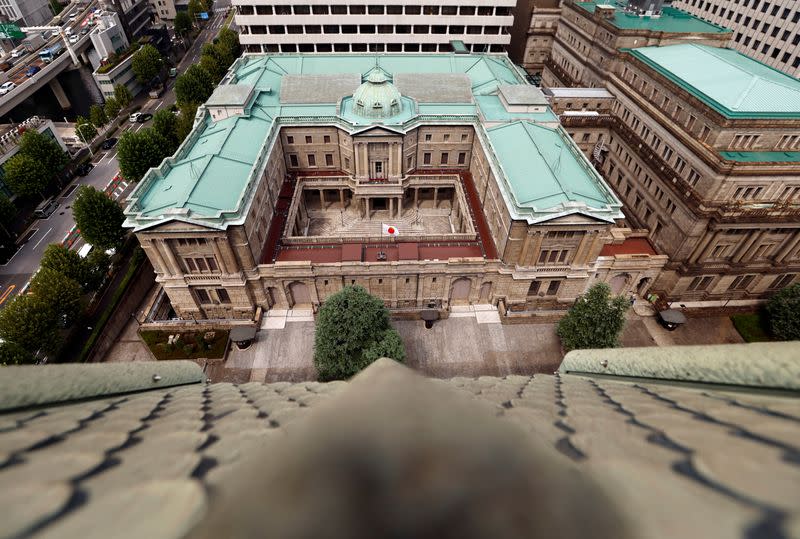BOJ policymaker hints at rate hike if yen's impact on inflation is big

By Leika Kihara and Takahiko Wada
TOKYO/KUMAMOTO, Japan (Reuters) -The Bank of Japan may raise interest rates if sharp falls in the yen boost inflation or the public's perception of future prices move more than expected, board member Seiji Adachi said on Wednesday.
While short-term currency moves alone would not trigger a policy shift, the central bank could raise interest rates if excessive yen falls persist and have a big impact on inflation expectations, Adachi said in a speech.
He also said the BOJ must look not just at downside risks to the economy and prices, but upside risks, in guiding policy.
"We must by all means avoid raising interest rates prematurely. But by focusing too much on downside risks, we could see inflation accelerate in a way that forces us to tighten monetary policy sharply later on," Adachi said.
"As long as underlying inflation continues to head toward 2%, it's important to gradually adjust the degree of monetary support reflecting economic, price and financial developments," he said, signalling the chance of a near-term rate hike.
The remarks highlight the growing significance a weak yen could have on the timing of the BOJ's next interest rate hike, which some analysts say may occur as soon as July.
His comments failed to underpin the yen, which drifted to its softest level in four weeks against the dollar on the back of rising U.S. yields. After hitting an intraday high of 157.41 yen, the dollar stood at 157.10 on Wednesday.
Adachi said consumer inflation will re-accelerate from the summer through around autumn this year due to rising import costs and prospects of sustained wage gains.
"If yen falls accelerate or persist, consumer inflation may rebound sooner than expected. If this happens at a time when there is a higher chance of inflation durably and stably exceeding 2%, we may need to push forward the timing of an interest rate hike," Adachi said.
Ideally, the BOJ will raise rates at a "slow pace" in line with steady increases in underlying inflation, Adachi said in a news conference after delivering the speech to business leaders in Kumamoto, southern Japan.
The yen has depreciated by roughly 10% against the dollar so far this year despite the BOJ's decision in March to end eight years of negative rates, as markets focused on the still-huge divergence between U.S. and Japanese interest rates.
The weak yen has become a headache for policymakers worried about the hit to consumption from rising import costs, and led some market players to bet on the chance of a near-term rate hike to slow the currency's depreciation.
Japan's consumer sentiment worsened for the second straight month in May as rising prices hit households, a Cabinet Office survey showed on Wednesday.
The government revised down its assessment on consumer sentiment to say "improvements were stalling," compared with the previous month's view that it was improving.
NO STEER IN RATE HIKE, TAPER TIMING
Expectations of a near-term rate hike helped push up Japan's 10-year government bond yield to 1.07% on Wednesday, the highest since December 2011.
Some traders also bet the BOJ could decide on a full-fledged tapering of bond purchases next month, after it caught markets off guard with an unscheduled cut in bond buying on May 13.
Adachi said the BOJ would reduce its bond buying some time in the future in accordance with its decision in March to end a policy that capped bond yields around zero.
But he said the March 13 bond buying reduction had no policy implication, adding that it was too early to determine whether recent rises in Japanese long-term yields would be sustained.
"I don't have a strong view on whether the BOJ should reduce bond buying soon, or wait longer," Adachi said, adding the bank had no pre-set idea or schedule in mind on the future pace of tapering.
Any reduction in bond purchases will be done in several stages to avoid destabilising markets, he added.
BOJ Governor Kazuo Ueda has said the central bank intends to hike rates to levels considered neutral to the economy, as long as growth and inflation move in line with projections.
The governor has also said the BOJ will no longer use its bond purchases as a monetary policy tool, and eventually scale back the size of its huge balance sheet.
(Reporting by Leika Kihara and Takahiko Wada; Editing by Jacqueline Wong, Sam Holmes and Toby Chopra)

 Yahoo Finance
Yahoo Finance 